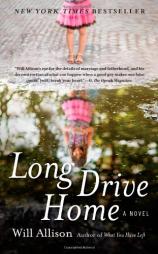Reading Group Guide
Discussion Questions
Long Drive Home

1. While driving home with his daughter, Sara, Glen Bauer engages in a showdown with a teenage driver, Juwan Howard, that results in tragedy. Do you think the accident is all Glen’s fault? If not, how much of the blame rests with Juwan?
2. After being interrogated by the police, Glen lies to his wife, Liz, about the accident too: “I waited until we got to the restaurant to tell my version, basically the same story I’d told the police. Somehow, with Liz, it felt like even more of a lie.” (p. 30) Why doesn’t he tell her the truth? What are the ramifications?
3. Later, after Glen confesses more of the truth to Liz, she tells him, “[You] can’t really say [the accident] was your fault. You might have been involved, but that’s not the same. You were just minding your own business. He was the one breaking the law. He caused the accident.” (p. 53) How do you feel about her argument?
4. After watching Tawana, Juwan’s mother, break down at the site of the accident, Glen is consumed with guilt: “I remember feeling like it would serve me right if something terrible happened to my family too. To get what I’d given. That’s what I would have wanted, I think, if I had been in her shoes.” (p. 44) Do you think he’s right, or would Tawana have shown more forgiveness than he imagines?
5. Glen and Liz decide to attend Juwan’s funeral for very different reasons. What are they? Do you think either has an ulterior motive?
6. How do Glen’s first impressions of Juwan differ from his later impressions? Do you think his attitude toward Juwan has anything to do with race?
7. “My run-in with the Suburban guy was no more a mere footnote to the accident than the accident itself was an isolated, out-of-the-blue event. On the contrary, it had been the culmination of that whole afternoon, in which A led to B led to C.” (pp. 63-64) Do you find this line of reasoning convincing? How much do the events leading up to the accident contribute to the accident itself?
8. Glen doubts his ability to deceive Detective Rizzo: “A guilty conscious can be tricky that way: knowing I was lying made it hard to believe anyone else could believe me.” (p. 77) When do you think Rizzo first becomes suspicious of Glen?
9. “It’s about Sara,” Liz tells Glen. “Her future. I’ve worked hard to give her a good one---we both have --- and I’m going to make sure she gets it.” Do you feel Liz is justified in demanding a divorce? (p. 84-85)
10. Glen doesn’t understand Liz’s behavior: “[D]espite what she said, I can’t believe the accident was the only thing she was reacting to. I think she must have been mad at me for a while, or disappointed at the way our marriage had turned out. Somehow all of that got tangled up in the decision she was making.” (p. 93) Do you think he’s right? What other factors might be involved?
11. Recalling his conversation with Tawana outside Burris’s office, Glen says, “Looking back, I suppose it must seem like I wanted to get caught.” (p. 118) Do you believe he did, subconsciously? And if so, does this subconscious urge manifest itself elsewhere in the story?
12. Structurally, Long Drive Home alternates between excerpts from Glen’s letter to Sara and passages of conventional first-person narration. Do you think Glen is a reliable narrator? Is he more, or less, reliable in the letter? Are there points at which you feel you understand Glen better than he understands himself?
13. Glen becomes increasingly obsessed with Derek Dye: “Maybe I couldn’t blame him for the accident, but if I’d been a bomb waiting to go off that day, he was the one who’d lit the fuse. He was the one who’d made me a bomb in the first place.” (p. 153) Why do you think Glen ultimately attacks Derek?
14. When Detective Rizzo confronts Glen at the bar, he accuses him of having no conscience: “It’s like you’re broke inside.” (p. 159) Do you believe Glen truly has no conscience? What would you have told the police?
Long Drive Home
- Publication Date: February 7, 2012
- Genres: Fiction
- Paperback: 240 pages
- Publisher: Free Press
- ISBN-10: 141654304X
- ISBN-13: 9781416543046








